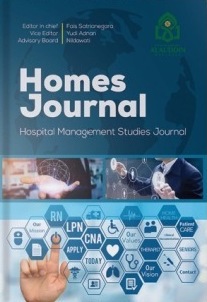INFLUENCE OF FOOD INTAKE ON THE EVENT DIABETES MELLITUS IN THE WORK AREA OF HEALTH CENTER WOTU DISTRICT WOTU IN 2021
Abstract
Background:Diabetes mellitus is a metabolic disorder characterized by abnormal blood sugar levels in a person, this disease can attack several organs of the body causing various kinds of complaints. Food intake is food and drink that is consumed at a certain time when someone needs it.
Objective:This study aims to determine the relationship or influence of food intake on the incidence of Diabetes Mellitus in the work area of the Wotu Health Center, Wotu District.
Method: The research design used was cross-sectional. The population in this study amounted to 68 respondents who suffered from Diabetes Mellitus at the Wotu Public Health Center, Wotu District in 2021. The sampling technique used was consecutive sampling and obtained a sample of 40 respondents. The data collected in this study were data on food intake, blood sugar levels, age, gender, and occupation. Pearson correlation test was used when analyzing data.
Result:The results of the study of the most prevalence of normal blood sugar levels in respondents were 42.5%, where respondents with good food intake were 40%, the results of the analysis using the Pearson Correlation test showed that the p-value was 0.000 smaller than the alpha value (0.05) so that it could be stated that Ho was rejected, which means that there is an effect of food intake on the incidence of diabetes mellitus in the working area of the Wotu Public Health Center, Wotu District.
Conclusion:This study is that there is an effect of food intake on the incidence of diabetes mellitus in the work area of the Wotu Public Health Center, Wotu DistrictReferences
Ahmad, N. S., Ramli, A., Islahudin, F., & Paraidathathu, T. (2013). Medication adherence in patients with type 2 diabetes mellitus treated at primary health clinics in Malaysia. Patient preference and adherence, 17 (7), 525-30. https://doi.org/10.2147/ppa.s44698
Dinkes Sulsel. (2018). Data PTM Sulsel 2017. Makassar: Dinas Kesehatan Provinsi Sulawesi Selatan.
Almatsier, S. (2009). Prinsip dasar ilmu gizi. Jakarta : Gramedia Pustaka Utama.
Andi Mardhiyah Idris, Nurhaedar Jafar, R. I. (2016). Pola Makan Dengan Kadar Gula Darah Pasien DM Tipe 2. Jurnal Mkmi, 10(4), 211–218.
Asdinar. (2014). Hubungan Pola Makan Dengan Resiko Penyakit Diabetes Melitus Di Puskesmas Caile Kecamatan Ujungbulu Kabupaten Bulukumba Tahun 2013. Jurnal Ilmiah Kesehatan Diagnosis, 4 (2), 248-254.
Cholifah, N., Azizah, N., & Indanah. (2016). Hubungan Antara Pola Makan Dan Aktivitas Fisik Dengan Kadar Gds Pada Pasien Diabetes Mellitus (DM) Tipe Ii Di Puskesmas Mayong Ii Jepara Tahun 2015. Jurnal Ilmu kesehatan Kudus (JIKK), 7 (2), 1 – 79.
Depkes RI. (2013). Riset Kesehatan Dasar (RISKESDES). Badan Penelitian Dan Pengembangan Kesehatan, Departemen Kesehatan RI, Jakarta.
Imelda Sonta. (2019). Faktor-faktor yang mempengaruhi terjadinya diiabetes melitus di puskesmas Harapan Raya. Scientia Journal, 8 (1), 1-11.
International Diabetes Federation (IDF). (2015). Diabetes Melitus. http ://www.oedg.at/pdf/1606 IDF Atlas 2015 UK.pdf.
Nursalam. (2015). Manajemen Keperawatan. Jakarta : Salemba Medika.
Fatin Nur. (2017). Asupan Makanan dan Faktor Yang Mempengaruhinya. http://Seputarpengertian.blogspot.com/2017/05/pengertian-asupan-makanan-dan-faktor-.html?m=1
Riset Kesehatan Dasar (Riskesdas). (2018). Badan Penelitian dan Pengembangan Kesehatan Kementerian RI tahun 2018.
Silalahi & Alif. (2015). Metode Penelitian Sosial Kuantitatif. Bandung: Rafika Aditama.
Soegondo. (2015). Penatalaksanaan Diabetes Melitus Terpadu. Jakarta: Balai Penerbit FKUI.
Suiraoka, IP. (2012). Penyakit degeneratif. Mengenal, Mencegah dan Mengurangi Faktor Resiko 9 Penyakit degeneratif. Yogyakarta: Nuha Medika
Sudaryanto, A., Setiyadi, Alis, N., & Frankilawati, Ayu, D. (2014). Hubungan Antara Pola Makan, Genetik Dan Kebiasaan Kerja Puskesmas Nusukan, Banjasari. Prosiding Snst, 1 (3), 19–24.
Susanti & Difran Nobel Bistara. (2018). Hubungan Pola Makan Dengan Kadar Gula Darah Pada Penderita Diabetes Melitus. Journal Kesehatan Vokasional, 3 (1), 29-34. https://doi.org/10.22146/jkesvo.34080
Sumangkut, S. (2013). Hubungan Pola Makan dengan Kejadian Penyakit Diabetes Melitus Tipe 2. Jurnal Keperawatan, 1 (1), 1-6.
Yulianto, S. (2014). Makanan Berbahaya Untuk Diabetes. Jakarta : Rineka Cipta
WHO. (2017). Global report on diabetes. Geneva: World Health Organization.
Tukloy, M. (2014). Hubungan Pola Makan dan Aktifitas Fisik dengan Kejadian DM tipe II di RSUD Karel Sadsuitubun Langgur. Ners Jurnal Keperawatan, 13 (2), 70-77. https://doi.org/10.25077/njk.13.2.70-77.2017


